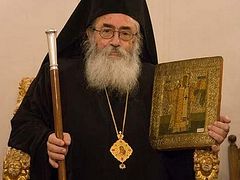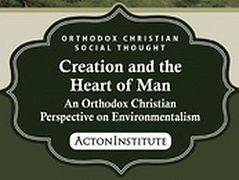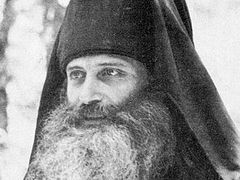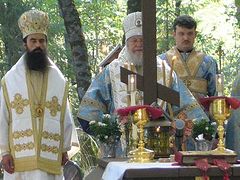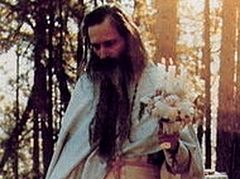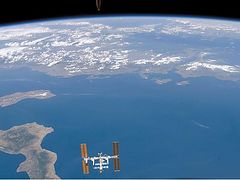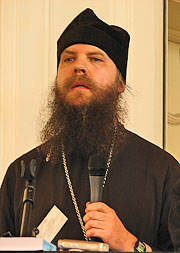 On Wednesday, the fourth day of the annual Nativity readings began the conference section dedicated to the «Orthodox understanding of creation of the world». One of the speakers was an Orthodox hieromonk, Fr. Damascene (Christensen), an American from the Monastery of St. Herman of Alaska in Platina, California, which belongs to the Serbian Orthodox Diocese of Western America. This monastery is well known in Russia as the home of Fr. Seraphim Rose, its founder, and Fr. Damascene is a member of the Brotherhood from the time of Fr. Seraphim’s repose. He is the author Fr. Seraphim’s biography (due to appear in a new Russian version this year under the title Father Seraphim Rose: His Life and Works), and is something of expert on Fr. Seraphim’s Life and writings in general.
On Wednesday, the fourth day of the annual Nativity readings began the conference section dedicated to the «Orthodox understanding of creation of the world». One of the speakers was an Orthodox hieromonk, Fr. Damascene (Christensen), an American from the Monastery of St. Herman of Alaska in Platina, California, which belongs to the Serbian Orthodox Diocese of Western America. This monastery is well known in Russia as the home of Fr. Seraphim Rose, its founder, and Fr. Damascene is a member of the Brotherhood from the time of Fr. Seraphim’s repose. He is the author Fr. Seraphim’s biography (due to appear in a new Russian version this year under the title Father Seraphim Rose: His Life and Works), and is something of expert on Fr. Seraphim’s Life and writings in general.
—Tell us how you developed your interest in the subject of creationism?
—I developed my interest in this subject through my work on Fr. Seraphim’s book, Genesis, Creation, and Early Man. I spent about a year and a half editing this book, researching the subject, adding introductory material and a lengthy epilogue, and footnotes to it. It needed a lot of work because Fr. Seraphim had left this work unfinished. The work was taken from notes, articles and taped lectures that Fr. Seraphim had given. He was unable to finish it before his repose, and I was to finish the work that he had begun.
In working on this project, I became deeply inspired by the presentation of creation that we find in the writings of the holy fathers—which of course are based on the holy scriptures—and their vision of creation, the six days, the first created world, and the fall of man. I came to see in working on this book how important this was, not just as one segment of theology related to the beginning of things, but as something relevant to the whole sum of our Orthodox theology. It is integral to our understanding of man, to our understanding of our redemption by Jesus Christ; and it is directly linked to our eschatology, because our understanding of the future age is based in our understanding of the first created world.
According to the consensus of the Orthodox holy fathers, the entire first created world--not only paradise--was incorrupt, without death. It was a totally different reality than what we know today. There was no pain, nor suffering, nor disease, nor sickness; all these things came into being through the fall.
When Christ died on the cross, He took upon Himself the sentence of sin, while being Himself totally sinless. By taking upon Himself the sentence of sin, which is death, He redeemed men from death. Thus, the idea of evolution over billions of years undermines not only the Patristic teaching of the creation and the first created world, but also the Orthodox understanding of redemption. It makes no sense to say that Christ died on the Cross to take away the sentence of sin, which is death, if you believe that the world is billions of years old. If the world is billions of years old and if the evolution of man from the swamp really occurred, there had to be millions of years of suffering, sickness death before man even came on the scene.
Thus I came to understand that, in order to uphold our Orthodox understanding of history and theology, we have to have an answer to those who say that the world is billions of years old and that we have evolved from the swamp. If we do not have an answer, then we allow our theology to be undermined. We can say, “Well, why don’t we just believe in Orthodox theology but forget about the history, because what does history matter? The Bible doesn’t have to be literally true, we can believe that the world is billions of years old, and man descended from an ape, and at the same time believe in the theology of the Church.” This combination, however, is impossible, because our theology is rooted in history. Our understanding of man (Orthodox anthropology), of our salvation (soteriology), and of our ultimate end and purpose (eschatology), are all rooted in history: in real events that have happened or will happen.
According to Orthodox Patristic teaching, man was created incorrupt, endowed with the inward grace of God. He fell, lost this inward abiding of grace, and became subject to physical corruption and death. Christ the new Adam, the incarnate God, through His incarnation, death and resurrection, redeemed man from spiritual death, making it possible for man to have the inward dwelling of grace, and to one day to be resurrected in a new spiritual body. The future age will be like the first created world, but even greater than it, even more spiritual. It will be the world to which the first Adam was supposed to attain, but failed. The second Adam, Christ, has made this possible for man, and will bring into being this future age, restoring what was lost through the fall, bringing to fulfillment everything that man was supposed to become. So, all of these things—the first created world, the fall, the incarnation of God in Jesus Christ, His death and resurrection, the second coming of Christ, the general resurrection and beyond it—are rooted in time and history. We cannot divorce our theology from real events. We must believe as the holy fathers did, that these are not merely allegorical events that we read about in the book of Genesis. Sometimes the holy fathers give an allegorical interpretation to something in Genesis, like the tree of the knowledge of good and evil, but they never deny its literal reality. If you read the holy fathers as Fr. Seraphim did, seeking to understand what they are saying, you will see that the holy fathers say that the things that we read about in Genesis are true just as they are written. We must understand them as such in order for our theology to be sound, and to protect ourselves against error and heresy.
So, through working on Fr. Seraphim’s book, I came to see the tremendous importance of this subject —of Genesis, creation, and early man. I came to see how it touches upon all aspects of Orthodox theology, and I also became more aware of how on this theology was being undermined in modern times, how Orthodox Christians were compromising their faith due to the power of modern secular ideas. I saw that this is a subject that really should be talked about and discussed, and that the teachings of the holy fathers should be presented and defended.
—How did you meet Fr. Seraphim, and how long did you know him?
—I met Fr. Seraphim in 1981, May 14 to be exact, when he came to my college campus, at the University of California in Santa Cruz. He gave two lectures. The first lecture was called “Contemporary signs of the end of the world,” and the second lecture was called “God’s revelation to the human heart.” At that time I was looking into Orthodoxy. I had discovered it in a college class on world religions, and had begun attending services, but I had not made a definite decision to become Orthodox. Meeting Fr. Seraphim was a catalyst for me to become Orthodox. My first impressions of him were very strong. I felt from the first meeting that he was the wisest person I had ever met in my life, in the sense of having true spiritual wisdom. I also felt, just from his presence, that he was dead to himself, and dead to the world. I was tremendously impressed with him. He invited me to the monastery that coming summer, and I went in August, attended the classes given by Fr. Seraphim during that time, during the St. Herman Summer Pilgrimage. I was at that time made a catechumen.
Then, during the following year, I visited the monastery several times and would have talks with Fr. Seraphim. He became my spiritual father, prepared me for baptism, and he was going to be my Godfather. I went to the monastery the following summer to be baptized by Fr. Seraphim. Soon after I arrived he got sick, and after a brief but painful illness, about twelve days after I arrived he reposed in the Lord. I was there during the whole time of his suffering in the hospital, up until the time of his repose, and I was baptized while he was dying in the hospital. So I did know him for a year and a half, and I had many fruitful talks with him. He was the one who prepared me to enter the Church. After he died I felt called upon to continue his work and to make his spiritual inheritance known to the world. Very soon after his repose I began writing articles about him, and then a year after he died I began writing his biography.
—What especially do you remember about him?
I have already mentioned the wisdom that I perceived in him during his life. After studying his life and writings extensively after his death, I would say the same thing about him, but with a more full understanding of it.
He was a brilliant person, extremely intelligent. But intelligence can sometimes hinder rather than help a person come to wisdom. An intelligent person can take so many complex routes around the truth but he never arrives at it. He can convince himself of something that is totally untrue by his mental acrobatics. Fr. Seraphim was quite the contrary. He was extremely intelligent, but he was also very simple. His mental vision was clear and pure. He had a unique gift of being able to go right to the heart of a question, and get to the essence of what he was contemplating, to cut through all kinds of deceptions and mental detours from the truth. He could see the fallacies of false arguments, and cut through peoples’ attempts to get around the truth.
But it is not only Fr. Seraphim’s simplicity and clear-sightedness that makes him such a valuable Orthodox teacher for our times. Together with these qualities he was, as I felt at my first meetings with him, dead to the world. As he himself said not long after becoming Orthodox, “When I became a Christian, I voluntarily crucified my mind.” In other words, he died to himself, he cut off all his own opinions, and humbled his mind before the mind of Christ, because he came to know Christ as the Truth. As he wrote, he came to know that “the Truth is not an idea, sought and known by the mind, but is a Person, known and loved by the heart”—that is, the Divine-human Person, Jesus Christ. He knew that Truth as embodied in the Church, because the Church is the body of Christ, and Christ is the mind of the Church. And the mind of the Church, which is the mind of Christ, is expressed in the writings of the holy fathers, which of course are based on the Holy Scriptures.
So, Fr. Seraphim humbled his mind in order to acquire the mind of the Church. He prayed to the holy fathers to help him enter into their mind. He sought not only to learn what the holy fathers said about various subjects, but also to see reality as they saw it. I believe he did this because he had true humility. He did not have any modern prejudices; he set all those aside, and died to himself. Therefore, in reading Fr. Seraphim’s writings, you are reading the pure teachings of the holy fathers, written by someone who has acquired their mind.
—Tell us about the theme of your lecture.
The theme of my lecture was creationism in America—an Orthodox analysis. Because I came from America I thought that people would be interested in what is happening in America in the creation versus evolution debate. I spoke about the various creationist groups in America, and about the Intelligent Design movement and its role in bringing the evolution debate out of the religious sector and into the public sector. I gave a general overview of what’s happening in America, because this is a very hot topic there right now. It is very much in the news, and the battle lines are being drawn. There is a war going on, because the evolutionary establishment is losing ground. The public is becoming more aware of the flaws in the theory of evolution. Once these become known, people who are really seeking the truth will lose faith in evolution. For, while evolution is true to a very limited degree—in that there can be adaptive variations in different kinds of organisms—the idea that man evolved from a microscopic organism is not observable by science. The latter kind of evolution is a faith, and has no scientific basis. From findings in molecular biology and genetics, it is becoming more and more clear that such evolution is impossible.
Finally, in my talk I discussed the similarities and differences between Protestant creationism and the Orthodox understanding of creation and the first-created world. There are many similarities, but there are also many differences. I went into the differences in order to give Orthodox creationists a better idea as to how to approach the work of Protestant creationists in America: how we can learn from their writings, and in what aspects we diverge from their way of thinking. The text of my lecture will be printed in volume three of the publication printed by the миссионерско-Проветительский Центр «Шестодневъ», Православное Осмысление Творения Мiра.
—Tell us about the conditions and atmosphere of public education in America, with respect to evolution.
—Over 50% of Americans believe the Biblical account of creation. They believe that God created man in his present form less than 10,000 years ago. A smaller number believe that evolution happened through God, while only 10% believe in a totally naturalistic evolution. That 10% controls the policy of public schools in America. So evolution has a vice grip on public education. Not only is creationism not allowed; a recent supreme court ruling prohibited even a mention in a brief paragraph that there is some kind of intelligent cause for living things, stated in a vague and general way. The only thing that can be taught in public schools is that everything happened through chance and natural processes. God is totally excluded from the discussion of the origin of life in the schools. However, since over 50% of the public believes in special creation and in a young earth, much of the public is not happy with the situation. Therefore, they have been trying to find ways to have a more complete discussion of the subject. They wish for the problems of evolution to be discussed, and that at least some idea of an intelligent designer of creation be presented.
In the last few years, there have been some positive developments in the United States. Five states have recently adopted resolutions to allow the scientific criticisms of evolution to be taught in public schools. This is a big step forward because, once the problems of evolution are discussed, any person with a rational mind can see that evolution cannot have occurred in the way it is described. In other words: Yes, living things can change and adapt to other environments, but microorganisms cannot evolve into man.
As can be expected, the evolutionists are furious at this development. They are doing everything they can, not only to keep creationism out of public schools, not only to keep out the idea of an intelligent designer, but also to keep out any questioning of evolution. They consider evolution to be a “dogma” that cannot even be questioned. It has to be taught as dogma and as fact, when in fact it is a faith. So, this is a very volatile issue now. Although America is supposed to be a democracy, in this case, the majority does not rule. A small minority is ruling, but as I said, changes are beginning to be made.
—How do you see the future in this regard? Judging from what you see now, can the evolutionists really be overruled?
—It is hard to say. It has been said by creationists that evolution is the biggest hoax of the 20th century. We can only hope that it will not be the biggest hoax of the 21st century.
Evolutionists have dug in their heels. The American Civil Liberties Union, an anti-Christian organization of lawyers and activists, fights vigorously in court against any challenge to evolution in the public schools. There is also an organization called the National Center for Science Education which is dedicated to fighting against any mention of creation in the schools. It is a very big struggle, and it is hard to say how it will play out.
Even if Darwinistic evolution becomes outdated, there is still the danger, coming from those who do not believe in the Christian God, of a rejection of the purely Darwinian concept of evolution—that everything came from natural causes—and the embracing of a pseudo-spiritual evolution: the kind of spiritual evolution that we find in the Theosophy of Madame Blavatsky and Alice Bailey, the Anthroposophy of Rudolf Steiner, the writings of Teilhard de Chardin, the Kaballah, the New Age movement, etc. According to this teaching of spiritual evolution, God is identified with the creation, and the creation is seen as evolving to Divinity. This is a heretical, pagan idea that could replace, in the minds of many, the purely Darwinian concept of evolution. Proponents of the New Age in America, such as Ken Wilber, say that “evolutionary spirituality” is the “cutting edge” of the new religious consciousness. This is the spirituality of Antichrist. In the epilogue to Fr. Seraphim’s book [Genesis, Creation, and Early Man] there is a lengthy discussion of how this evolutionary spirituality is deeply anti-Christian.
—How did you like the Nativity Readings?
—I think that it is wonderful that Patriarch Alexei II has instituted such lectures, in order to educate people in the Faith, and that the doors are open for all to attend. It is a wonderful gift to his flock
—What would you like to say about the sponsor of the section on creation, “Shestodnev?”
—I am very inspired by the work of Shestodnev, which defends the Orthodox teaching on creation. We try to support this work as much as we can in our St. Herman Brotherhood, and in return we have received a lot of support from Shestodnev. Our Brotherhood, which strives to continue the work of Fr. Seraphim, is of one mind with Archpriest Constantine Bufeev and the Six Days Center, who also strive to continue Fr. Seraphim’s work of presenting the Orthodox teaching on Genesis and creation. Shestodnev is a leader in the whole Orthodox Church around the world in the defense of our Orthodox doctrine of creation. All those who contribute the books and articles to this work are making a great contribution to the Church.
By discrediting Biblical history and undermining Christian theology, the teaching of evolution has done more than any single idea in the past 150 years to corrode Christian Faith. Some Orthodox Christians try to save the faith by compromising, sort of joining the enemy. But those who look at the situation honestly can see that the Faith of Christ and the faith of evolutionism cannot be combined. Evolution says that man evolved from primal ooze, while Christianity states that man was created by God in a state much higher than we are now. These are totally different views, which cannot be reconciled. So the Church must come forth with the truth, and not compromise it or twist it. We can believe just as our Christian ancestors believed, just as our Orthodox holy fathers believed.
We therefore pray that God will continue to prosper the work of Shestodnev and of the whole Orthodox Church in defending our Faith.

